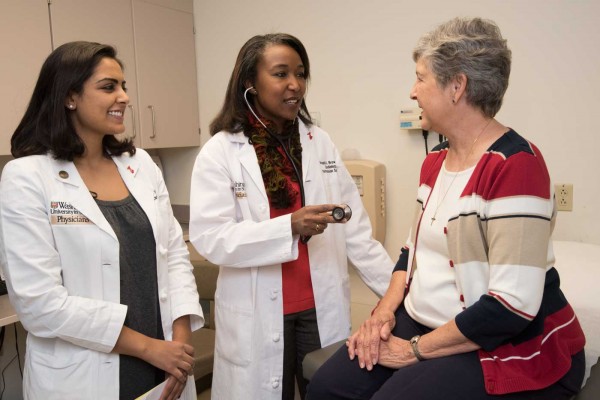Washington People: Angela L. Brown
Angela L. Brown, MD, associate professor of medicine, leads the Hypertension Clinic at Washington University School of Medicine. Brown has devoted her career to helping patients control their hypertension and to training medical professionals in how to care for such patients.
High blood pressure induces low fat metabolism in heart muscle
Hearts with muscle thickening (left) get less energy because of their reduced fat metabolism.”The heart is the single most energy-consuming organ per weight in the body,” says Lisa de las Fuentes, M.D. Under some conditions this energy-hungry organ is prone to defects in its energy metabolism that contribute to heart disease, according to research published in the Journal of Nuclear Cardiology by de las Fuentes and colleagues at the School of Medicine.
High blood pressure induces low fat metabolism in heart muscle
Echocardiograms show that the thickness of left ventricular (LV) walls in the hypertrophied heart (left) are nearly twice that of the normal heart.”The heart is the single most energy-consuming organ per weight in the body,” says Lisa de las Fuentes, M.D. Under some conditions this energy-hungry organ is prone to defects in its energy metabolism that contribute to heart disease, according to research published in the Journal of Nuclear Cardiology by de las Fuentes and colleagues at Washington University School of Medicine in St. Louis.
Study finds most students gain weight during early college years
College eating habits can pack on extra pounds.New work from researchers at Washington University in St. Louis confirms that most students gain weight in college. Reporting in the Journal of American College Health, the research team found that about 70 percent of students gained a significant amount of weight between the start of college and the end of sophomore year.
Study finds most students gain weight during early college years
College eating habits can pack on extra pounds.College students talk about the “Freshman 15.” That’s the typical number of credit hours a full-time student takes during a semester. Some also claim it’s the number of pounds students gain eating dorm food and studying all night. New work from researchers at Washington University in St. Louis confirms that most students do, indeed, gain weight in college. Reporting in the Journal of American College Health, the research team found that about 70 percent of students gained a significant amount of weight between the start of college and the end of sophomore year.
Exercise: It does the heart good
Studying elderly people with mild to moderately elevated blood pressure, researchers at the School of Medicine have found that exercise is just as effective as blood pressure medicine at reducing heart mass and the thickness of the heart wall. Exercise also provided benefits that blood pressure medicine did not, such as lowering an individual’s risk of developing diabetes.
Supersized servings and bigger beverages build bulging bellies
A major factor contributing to Americans’ increasing body sizes appears to be increasing portion sizes.Obesity puts people at risk for heart disease, diabetes, stroke, high blood pressure and cancer. It also decreases quality of life. But that’s not stopping Americans from eating and drinking more than ever before. Almost two-thirds of Americans are either overweight or obese, and a major factor contributing to increasing body sizes appears to be increasing portion sizes. Obesity researcher Samuel Klein, M.D., the Danforth Professor of Medicine and Nutritional Science at Washington University School of Medicine in St. Louis, says the obesity epidemic continues to get worse in spite of a great deal of research about the dangers of being overweight and increasing numbers of people who are trying to lose weight. Part of the problem is that many people tend to eat what is put in front of them, and serving sizes are larger than ever before.

